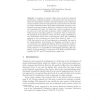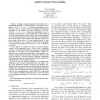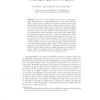14 search results - page 1 / 3 » On the Topological Complexity of Weakly Recognizable Tree La... |
121
Voted
FCT
2007
Springer
15 years 6 months ago
2007
Springer
We show that the family of tree languages recognized by weak alternating automata is closed by three set theoretic operations that correspond to sum, multiplication by ordinals <...
102
Voted
ATVA
2006
Springer
15 years 4 months ago
2006
Springer
In synthesis we construct finite state systems from temporal specifications. While this problem is well understood in the classical setting of non-probabilistic synthesis, this pap...
136
click to vote
COCO
2009
Springer
15 years 7 months ago
2009
Springer
—A simple averaging argument shows that given a randomized algorithm A and a function f such that for every input x, Pr[A(x) = f(x)] ≥ 1−ρ (where the probability is over the...
107
click to vote
ICALP
2010
Springer
15 years 5 months ago
2010
Springer
We propose a new approach to the notion of recognition, which departs from the classical definitions by three specific features. First, it does not rely on automata. Secondly, it...
102
click to vote
CORR
2012
Springer
13 years 8 months ago
2012
Springer
We consider the problem of recovering items matching a partially specified pattern in multidimensional trees (quad trees and k-d trees). We assume the classical model where the d...



